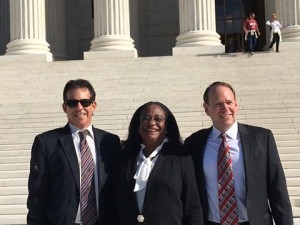California passed a bevy of new employment laws in 2016. Here is a summary of the most important ones.
Minimum Wage Increases (SB 3)
Beginning on January 1, 2017, employers with 26 or more employees will have to pay a minimum wage of $10.50 per hour. This minimum wage rate will gradually increase to $15.00 per hour by 2022 as shown below:
January 1, 2017 – 10.50
January 1, 2018 – 11.00
January 1, 2019 – 12.00
January 1, 2020 – 13.00
January 1, 2021 – 14.00
January 1, 2022 – 15.00
January 1, 2023 – 15.00
Smaller employers (with 25 or fewer employees) will be required to pay the higher minimum wage rates starting in 2018 as shown below:
January 1, 2017 – 10.00
January 1, 2018 – 10.50
January 1, 2019 – 11.00
January 1, 2020 – 12.00
January 1, 2021 – 13.00
January 1, 2022 – 14.00
January 1, 2023 – 15.00
Equal Pay Act Expanded To Cover Race And Ethnicity (SB 1063)
In 2015, the California Legislature enacted and Governor Brown signed Labor Code Section 1197.5 into law which made it the Nation’s most protective equal pay act. Section 1197.5 didn’t just require employers to pay employees of opposite genders equal pay for equal work but, instead, required equal pay for substantially similar work. This year, the Legislature enacted and Governor Brown signed into law amendments to the Equal Pay Act which prohibit wage differences based upon race or ethnicity for substantially similar work when viewed as a composite of skill, effort, responsibility, and performed under similar working conditions. Exceptions include where the payment is made based on any bona fide factor other than sex/race/ethnicity, such education, training, or experience.
Employers Prohibited From Using An Employee’s Prior Salary To Justify Wage Differences (AB 1676)
Employers often try to justify differences in pay between men and women by explaining that they based the differences on the employees’ prior salaries. This new law prohibits employers from using an employee’s prior salary, by itself, to justify any compensation disparity.
Employer’s Required To Provide Employees With Notice Regarding Domestic Violence, Sexual Assault And Stalking Protections (AB 2337)
California law prohibits employers from terminating or in any other manner discriminating or retaliating against an employee who takes time off from work to address domestic violence, sexual assault, or stalking. This new law mandates that employers must inform each employee of his or her rights established under these laws by providing certain information in writing to new employees upon hire and to other employees upon request.
Settlement Agreements Can No Longer Prevent The Disclosure Of Information Regarding Certain Sex Offenses (AB 1682)
Existing law allows parties to enter into a settlement agreement requiring the nondisclosure of information regarding sex offenses. This new law now prohibits parties from entering into settlement agreements (on or after January 1, 2017) that would prevent the disclosure of factual information that establishes a cause of action for civil damages for a felony sex offense, an act of childhood sexual abuse, an act of sexual exploitation of a minor, or an act of sexual assault against an elder or dependent adult.
Employees Of Temporary Services Employers Must Be Paid Weekly (AB 1311)
Current law (Labor Code Section 201.3) requires that temporary services employers must pay their employees weekly and that a violation of these provisions is punishable as a misdemeanor. This new law extends this weekly pay requirement to security guards employed by those who are both private patrol operators and temporary services employers.
Employers Can Not Ask An Applicant To Disclose Certain Criminal History Information (AB 1843)
Section 432.7 of the Labor Code prohibits employers (both public and private) from asking applicants for employment to disclose, or from utilizing as a factor in determining any condition of employment, information regarding an arrest or detention that did not result in a conviction. Certain information concerning a referral or participation in any pretrial or post-trial diversion program is also prohibited from disclosure.
This new law now prohibits an employer from asking applicants for employment to disclose, or from utilizing as a factor in determining any condition of employment, information concerning or related to an arrest, detention, processing, diversion, supervision, adjudication, or court disposition that occurred in juvenile court. In addition, this law provides that “conviction,” as used in the statute, excludes an adjudication by a juvenile court or any other court order or action taken involving a person who is under the jurisdiction of the juvenile court.
Employers Prohibited From Engaging In Certain Unfair Immigration-Related Practices (SB 1001)
Employers are prohibited from: (a) request more or different documents than are required under federal law; (b) refuse to honor documents or work authorization based upon the status or term of status that accompanies the authorization to work; or (c) reinvestigate or reverify an incumbent employee’s authorization to work. Applicants are authorized to file a complaint with the Division of Labor Standards Enforcement.
California Employees Guaranteed Access To California Law And Forum (SB 1241)
This bill applies to contracts entered into, modified, or extended on or after January 1, 2017 and prohibits an employer from requiring an employee who primarily resides and works in California, as a condition of employment, to agree to adjudicate outside of California a claim (in either litigation or arbitration) arising in California or deprive the employee of the substantive protection of California law with respect to a controversy arising in California. The bill specifies that injunctive relief is available as a remedy and authorizes a court to award reasonable attorney’s fees. The bill exempts a contract with an employee who was represented by legal counsel.
Like this:
Like Loading...

 On November 8, 2016, the U.S. Supreme Court heard oral argument in a case Helmer Friedman LLP successfully convinced the high court to hear. The case — Lightfoot v. Fannie Mae, Cendant Mortgage Corporation case (14-1055) — concerns whether individual homeowners who have been wrongly or fraudulently foreclosed upon by Fannie Mae have the right to sue the mortgage giant in the state courts.
On November 8, 2016, the U.S. Supreme Court heard oral argument in a case Helmer Friedman LLP successfully convinced the high court to hear. The case — Lightfoot v. Fannie Mae, Cendant Mortgage Corporation case (14-1055) — concerns whether individual homeowners who have been wrongly or fraudulently foreclosed upon by Fannie Mae have the right to sue the mortgage giant in the state courts.